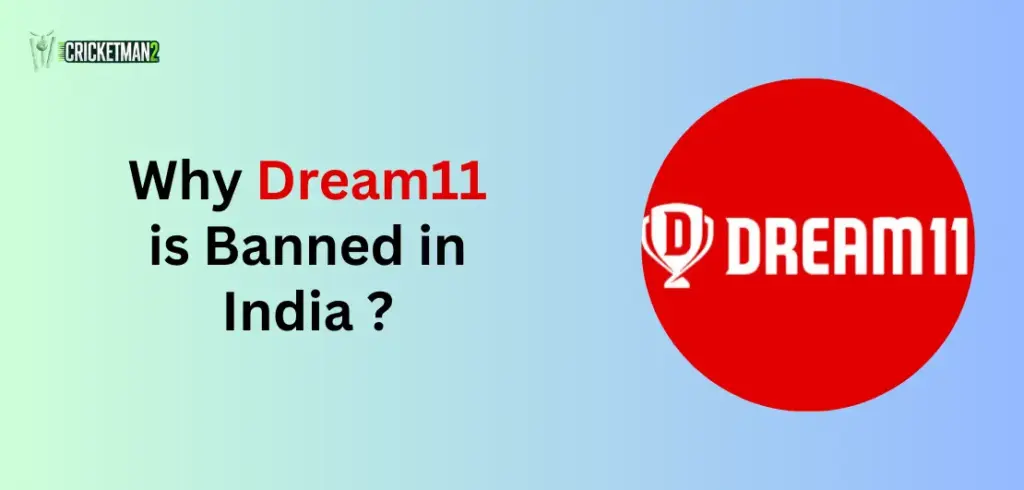Dream11, India’s largest fantasy sports platform with over 280 million users, has paused its real-money contests following the passing of the Promotion and Regulation of Online Gaming Bill, 2025. Once considered a symbol of India’s startup success, Dream11 now faces an existential crisis as the government has banned all online games involving money stakes.
This article explains in simple terms why Dream11 is banned in India, what the new law says, its impact on users, employees, and the gaming industry, and what may come next.
What Does the New Online Gaming Bill 2025 Say?
The Promotion and Regulation of Online Gaming Bill, 2025, passed in both Houses of Parliament, introduces a blanket ban on money-based online games.
| Category | What it Means | Status under the Bill |
|---|---|---|
| Esports | Competitive video games played professionally in tournaments | Recognised & Promoted |
| Social/Educational Games | Free-to-play casual games with no money stakes | Encouraged & Registered |
| Online Money Games | Any game requiring users to deposit money for a chance to win cash prizes (fantasy sports, rummy, poker, etc.) | Completely Banned |
Why Was Dream11 Banned?
The government listed several reasons:
- Addiction & Financial Losses: Families losing savings, with cases of debt and distress.
- Mental Health Risks: Reports of depression and suicides linked to money gaming.
- Fraud & Money Laundering: Platforms being misused for illegal financial activities.
- National Security: Investigations revealed links to terror financing and unlawful communication.
- Closing Legal Loopholes: Earlier court rulings had allowed Dream11 as a “game of skill.” The new law removes that distinction — now, any money game = banned.
Union Minister Ashwini Vaishnaw stated that over 45 crore people were affected and losses exceeded ₹20,000 crore due to money gaming.
Also see: Why Fantasy Cricket is Banned in India Under New Law
Immediate Impact on Dream11
- All paid contests paused on the Dream11 app.
- User balances are safe and can be withdrawn.
- Employees (full-time and contractual) have been briefed on transition plans.
- Dream Sports (parent company) is pivoting to other verticals:
- FanCode (sports media)
- DreamSetGo (sports travel experiences)
- Dream Game Studios (game development).
More than 90% of Dream Sports’ revenue came from Dream11 money-based contests — making this ban a near shutdown of its core business.
Penalties Under the Bill
| Offence | Punishment |
|---|---|
| Offering money games | Up to 3 years jail + ₹1 crore fine |
| Advertising money games | Up to 2 years jail + ₹50 lakh fine |
| Repeat offences | Up to 5 years jail + ₹2 crore fine |
| Banks/payment gateways processing such transactions | Penalised equally under the law |
Broader Fallout
- Sponsorships at Risk: Dream11, which signed a ₹358 crore deal as Team India’s jersey sponsor (till March 2026), may lose this partnership.
- Ad Industry Hit: Nearly ₹4,500 crore in ad revenues (from IPL, cricket leagues, celebrity endorsements) could disappear.
- Jobs & Startups: Over 200,000 jobs and more than 400 startups risk closure.
- Investments: The sector had attracted ₹25,000 crore in FDI, now under threat.
Concerns Raised
- Industry bodies argue the ban will push users toward offshore illegal apps, with no safeguards for consumers.
- Legal experts highlight contradictions with earlier court rulings that protected fantasy sports as skill-based.
- Constitutional challenges are expected, especially under Article 19(1)(g) (right to carry out business).
What Happens to Dream11 Users?
- Users can withdraw existing balances from the Dream11 app.
- No new paid contests are available.
- Free-to-play and esports-related content may continue in limited form.
The Online Gaming Bill 2025 represents a turning point for India’s digital economy. While it aims to protect youth and families from addiction, fraud, and financial ruin, it also dismantles an industry worth billions and employing lakhs of people.
For Dream11, the ban marks the end of an era. Its co-founder Harsh Jain, once celebrated as the face of India’s gaming unicorns, now faces the challenge of reinventing Dream Sports beyond money-based fantasy contests.
The final word: Dream11 is banned in India because real-money gaming itself is banned. Users can no longer participate in cash contests, marking the end of fantasy sports as it was known.






